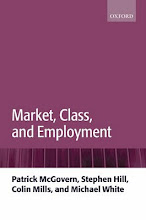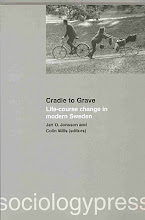Something I've been meaning to blog about for a while. The Guardian's Aditya Chakrabortty has been putting the boot into sociology for some time. With the cocksure confidence that only a degree in Modern History from Oxford University can produce he pronounces (seeming to share something of the level of scientific insight of the Italian courts): "economics has failed us" and it is up to sociology (political science seems to have got lost on the way) to explain what has gone wrong. He then has a right royal laugh at the flim flam served up at the annual buffoon's convention known as the British Sociological Association conference. It's easy to laugh at what goes on at that dreary affair. Few of any serious standing in the discipline attend or give papers and many of the titles and abstracts do indeed read like submissions to a particularly humourless pseud's corner.
I hold no brief for the type of sociology purveyed by the average BSA conference delegate, often a distressingly earnest postgraduate student fretting about identity politics, body image or reflexive modernity (whatever that is) . What has been surprising to me though is the feebleness of the response by grown up sociologists to the absurd premises of Chakrabortty's assault. It is not self-evident - as Chakrabortty seems to think it is - that economics (as an intellectual discipline) has failed. At least as a non-economist I'm humble enough to acknowledge that though it seems to me unlikely I'm actually not in a position to venture a particularly cogent opinion (as opposed to a rent-a-mouth sound bite). I also don't see any special reasons to expect numerous startling insights into the origins of the financial crisis from sociologists, anthropologists or indeed historians for that matter. Because something is important - as the financial crisis undoubtedly is - it doesn't necessarily mean that sociologists have the requisite intellectual tools to make a serious contribution to elucidating the problems and solutions. Sociologists may contribute a lot of hot air to global warming but we don't expect them to be key intellectual players in climate science. That's not a sign of failure: it's called the intellectual division of labour. Which is not to say that the odd sociologist might not have interesting and important things to say about the matter - we should for heaven's sake keep an open mind. But most of us are doing other things which we don't want to drop, some of which I acknowledge are (in my and apparently Chakrabortty's opinion) silly, while others are intellectually serious and useful - but not about topics which Chakrabortty finds fashionable or of journalistic interest.
Unfortunately those sociologists that have seen fit to comment have fallen into the trap that Chakrabortty either wittingly or unwittingly has laid for them. They appear desperate to demonstrate "relevance" and "impact" and only succeed, to my mind, in making themselves and the discipline look as absurd as Chakrabortty evidently believes it is. Don't take my word for it. You can judge for yourself from the information contained here about a debate to be held today at the University of Lancaster. My prediction for chuckle time is the one that "...argues that the current crisis is the delayed result of the failure of
capitalism after the 1970s to make a socio-technical transition away
from fossil-fuel technologies". Come on Dr Szerszynski, you need to go much further back in the causal chain. How about the Big Bang?









8 comments:
I (emphasis on “I”) think the issue here is to what extent the massed ranks of sociologists (including those at Salford University) have had nothing of any consequence whatsoever to say about the financial crisis despite its (a) big impact on well society really and (b) involving what are very obviously sociological processes e.g. when Sir George Matthewson talked about bonuses in terms of bragging rights in a soho bar, rather than financial or labour market driven notions of investment bank pay he was presumably highlighting its social meaning with that being a determining factor. Similarly, when people talk about the role of hubris and how that led to the destruction of the former building societies, they’re largely talking about the sociology of specific organisations and how power within them was accumulated and exercised.
I don’t think anyone is suggesting all sociologists need to stop what they’re doing NOW, least not lovely Oxbridge types, and reflect upon the financial crisis, not least because a lot of what that would generate would be third rate Guardian comment level tosh. Rather, it’s could the profession not do something besides the lovely, but ultimately harmless Professor Donald McKenzie stuff. And, at the level of a profession, why is being relevant a bad thing exactly?
I (emphasis on “I”) think the issue here is to what extent the massed ranks of sociologists (including those at Salford University) have had nothing of any consequence whatsoever to say about the financial crisis despite its (a) big impact on well society really and (b) involving what are very obviously sociological processes e.g. when Sir George Matthewson talked about bonuses in terms of bragging rights in a soho bar, rather than financial or labour market driven notions of investment bank pay he was presumably highlighting its social meaning with that being a determining factor. Similarly, when people talk about the role of hubris and how that led to the destruction of the former building societies, they’re largely talking about the sociology of specific organisations and how power within them was accumulated and exercised.
I don’t think anyone is suggesting all sociologists need to stop what they’re doing NOW, least not lovely Oxbridge types, and reflect upon the financial crisis, not least because a lot of what that would generate would be third rate Guardian comment level tosh. Rather, it’s could the profession not do something besides the lovely, but ultimately harmless Professor Donald McKenzie stuff. And, at the level of a profession, why is being relevant a bad thing exactly?
I wouldn't call it useless, my soc degree is my second high school diploma. There really is no such thing as a "sociologist." That's a little more painful than learning about Santa Claus after 10,000 job applications and 30K in student loans.
The Sociologist is really the doctorate in the school selling the undergraduate courses to the kids who believe. Those 100 level courses are commercials to get the kid locked in to the major with a generalist pitch. Professors will talk about this new trend, growing need, diversified skills that is promised at the next level 200, 300, 400....the empty promise continues to grad school. When you get out in the world, you're stuck with a whole bunch of course titles when employers ask for skills. "What can you do for me?" is the interview question and your sitting next to a candidate who spend the last 5 years studying accounting or some computer language. The generalist argument made by the soc degree is absolutely useless without one of these hard skills. Sure you have research and reporting skills, knowlede of organizations. So does everyone else. Counseling? Well, you need a master's degree to start there. Ask your placement counselor when you graduate and you're directed to the master's program to spend more money.
The world revoles around money and your undergraduate counselor is a salesman. It's a nasty paradigm shift, but at least you studied that..then you can compare the problem with the theories of Freud, Marx, Weber, and write a great paper.
It is less the case that sociology has failed than that governments have failed to heed their words. Bryan Wilson's excellent book on Education and Society (1965, from memory) is a case in point.
Afraid we'll have to agree to disagree on that one Anonymous if the book you refer to is the 1975 one with essays by Rhodes Boyson, John Lucas etc.
That was a great example of how not to do sociology ie it is essentially an evidence free expression of a bunch of deeply held convictions. Whether that sort of thing comes from the Left, the Right or the Centre it is not, in my view, sociology.
Colin, the book I was referring to was entirely authored by Bryan Wilson.
I'll have to take a pass on that then as I don't know the book you are referring to. Bryan was a top class scholar of religion and absolutely scrupulous about attention to evidence.
Alas he did not always hold himself to the same standards when it came to commenting about social issues outside of his field of expertise where his socially conservative predisposition tended to make him somewhat selective with respect to the facts he was willing to countenance.
You speak your mind earnestly. For that reason, even if everything you said are wrong, it is worth reading these.
Post a Comment